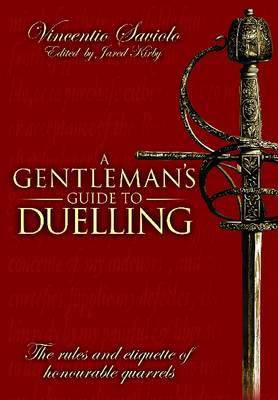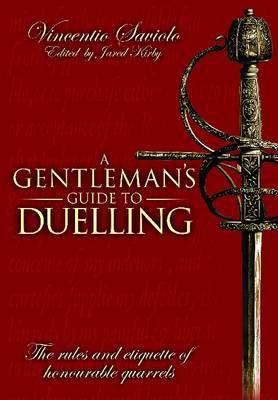
Je cadeautjes zeker op tijd in huis hebben voor de feestdagen? Kom langs in onze winkels en vind het perfecte geschenk!
- Afhalen na 1 uur in een winkel met voorraad
- Gratis thuislevering in België vanaf € 30
- Ruim aanbod met 7 miljoen producten
Je cadeautjes zeker op tijd in huis hebben voor de feestdagen? Kom langs in onze winkels en vind het perfecte geschenk!
- Afhalen na 1 uur in een winkel met voorraad
- Gratis thuislevering in België vanaf € 30
- Ruim aanbod met 7 miljoen producten
Zoeken
A Gentleman's Guide to Duelling
Vincentio Saviolo's of Honour & Honourable Quarrels
Vincentio Saviolo
Hardcover | Engels
€ 27,95
+ 55 punten
Omschrijving
'A humorous and instructive guide to Elizabethan etiquette which should interest gentlemen of any century.' James Shapiro, author of 1599: A Year in the Life of Shakespeare
'An excellent reference tool for scholars and a wonderfully practical one for historical fencers, fight directors and actors seeking information or inspiration on swordplay in the 16th century.'
Richard Ryan, Fight Coordinator for Sherlock Holmes I & II, Troy, Stardust and The Golden Compass
A Gentleman's Guide to Duelling is a beautifully illustrated, lyrical guide to dueling etiquette in Elizabethan England. Its author, Vincentio Saviolo, was one of the great Italian fencing masters and a contemporary of William Shakespeare. In the 1590s, both Saviolo and Shakespeare were based in London's Blackfriars; Shakespeare's use of Italian fencing terminology in Romeo & Juliet is no surprise as it was written shortly after Saviolo's book was published.
Originally published under the title Of Honour and Honourable Quarrels Saviolo's guide is devoted to the art of settling a duel in a gentlemanly manner. It was written in a time when honor, virtue and codes of behavior were of grave importance; and the rapier was seen as ideally suited to settling the disputes of a gentleman.
'An excellent reference tool for scholars and a wonderfully practical one for historical fencers, fight directors and actors seeking information or inspiration on swordplay in the 16th century.'
Richard Ryan, Fight Coordinator for Sherlock Holmes I & II, Troy, Stardust and The Golden Compass
A Gentleman's Guide to Duelling is a beautifully illustrated, lyrical guide to dueling etiquette in Elizabethan England. Its author, Vincentio Saviolo, was one of the great Italian fencing masters and a contemporary of William Shakespeare. In the 1590s, both Saviolo and Shakespeare were based in London's Blackfriars; Shakespeare's use of Italian fencing terminology in Romeo & Juliet is no surprise as it was written shortly after Saviolo's book was published.
Originally published under the title Of Honour and Honourable Quarrels Saviolo's guide is devoted to the art of settling a duel in a gentlemanly manner. It was written in a time when honor, virtue and codes of behavior were of grave importance; and the rapier was seen as ideally suited to settling the disputes of a gentleman.
Specificaties
Betrokkenen
- Auteur(s):
- Vertaler(s):
- Uitgeverij:
Inhoud
- Aantal bladzijden:
- 256
- Taal:
- Engels
Eigenschappen
- Productcode (EAN):
- 9781848325272
- Verschijningsdatum:
- 19/02/2014
- Uitvoering:
- Hardcover
- Formaat:
- Genaaid
- Afmetingen:
- 142 mm x 218 mm
- Gewicht:
- 408 g

Alleen bij Standaard Boekhandel
+ 55 punten op je klantenkaart van Standaard Boekhandel
Beoordelingen
We publiceren alleen reviews die voldoen aan de voorwaarden voor reviews. Bekijk onze voorwaarden voor reviews.









